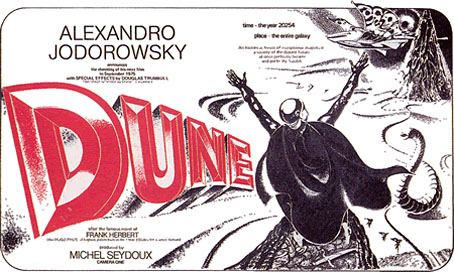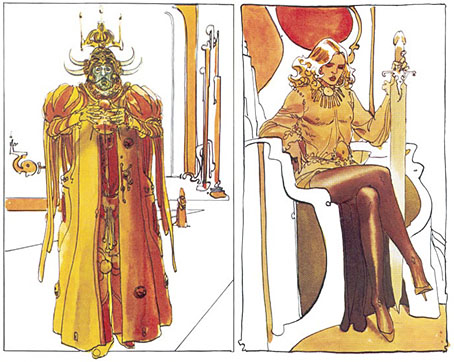
Fortunate Londoners can get to see a new exhibition, Alejandro Jodorowsky’s ‘Dune’: An exhibition of a film of a book that never was, which runs at The Drawing Room until October 25, 2009. As well as production designs from concept artists Moebius, HR Giger and Chris Foss, there’s newly commissioned work by artists Steven Claydon, Matthew Day Jackson and Vidya Gastaldon.
Jodorowsky’s proposed 1976 adaptation of the Frank Herbert novel is now the stuff of legend, and it’s possible that his outrageously ambitious plans are more fun to dream about than they would have been on the screen. But it remains a tantalising prospect that Jodorowsky might well have pulled off a science fiction equivalent of Fellini’s Satyricon. Either way, along with Stanley Kubrick’s unmade Napoleon, it’s one of the great lost films of the 1970s.
Among Jodorowsky’s proposed cast were Orson Welles, Mick Jagger and Salvador Dali, the last of whom was to play the Emperor of the Universe, who ruled from a golden toilet-cum-throne in the shape of two intertwined dolphins. Unable to secure the money from Hollywood to create the ‘Dune’ of his imagination, Jodorowsky abandoned the film before a single frame was shot. All that survives of this project is Jodorowsky’s extensive notes, and the production drawings of Moebius, Giger and Foss. These reveal a potential future for sci-fi movie making that eschewed the conservative, technology-based approach of American filmmakers in favour of something closer to a metaphysical fever-dream.
left: Emperor Shaddam IV; right: Feyd Rautha.
Moebius’s designs are wildly different from those used in David Lynch’s 1984 adaptation (which I like nonetheless). His sketch of the Emperor on the left gives some idea of how Salvador Dalí might have appeared in the film, while the figure on the right is Baron Harkonnen’s effete nephew, Feyd, a far more radical conception than the grinning fool played by Sting in the Lynch version. There’s a lot more of Moebius’s sketches at the excellent Dune.info site.
Previously on { feuilleton }
• Dalí and Film
• Jodorowsky on DVD


Now I ask you, how crushingly dull would you have to be to refuse to fund this project? Although to be fair Jodorowsky probably asked for a billion dollars.
He was ambitious but not out of control (unlike Dalí). If you look at the Dune site there’s some fascinating reading where Jodorowsky tries to persuade Dalí to be involved without breaking the budget, which at that time was $9.5 million. The Lynch film cost an alleged $40 million although some of that figure was probably hyped by Dino De Laurentis. Jodo’s Dune would have cost less than Barry Lyndon did in 1975 ($11 million) while being far more ambitious.
Yes, if I am not mistaken Dali wanted something like a $million a week or maybe even a day. In those days a million a week was unlikely even for the filthy rich, but shit a million a day!? The forces of nature that modern religions have written off as sins are just that, forces of nature in man. One would think with the amount of nerves endings connecting the brain to the crotch that ‘Lust’ would be the most powerful of these, but it isn’t, somehow it’s ‘Greed.’
I admit to knowing almost nothing about ‘Dune’ probably just because Herbert was friends with L. Ron Hubbard and that was enough to turn me away. It certainly doesn’t seem like traditional science fiction, something I’ve never had any patience with, Lynch adapted it for one.
I’ve seen the ideas proposed by Giger, as nice as one would expect, I’ve never seen those by Moebius though, very nice as well. Jodorowsky’s version may have had a planet that resembled something straight out of Yoshitaka Amano’s dreams.
If Jodorowski got to direct the filme, it would probably be better than the David Lynch production, the way I see it, a complete wreckage. I remember “El Topo” and “Holy Blood”, not to mention his comic books, such as “The Incal” and despair for never getting to see his “Dune”. Well, things are as they are…
Best!
I’m sure you’re right but I’m afraid I don’t like to think of Jodorowsky being anything other than out of control.
Wiley: Jodorowsky managed to reduce the fee a little. It was Marlon Brando a few years later who received a million dollars a day for his appearance in Superman.
Herbert couldn’t really help but know Hubbard since he was of the generation of sf writers who pretty much invented the field as we know it today. Hubbard was a part of that too, before he realised that inventing a religion would be more lucrative; the sf world in 1940s America was very small and nearly everyone knew each other, wrote for the same magazines, started the conventions, etc.
Dune is one of the last books of that type I read before I gave up on hard sf and space opera. It’s fairly typical of works of that kind being essentially a 19th century novel of empires and intrigue with an added futuristic gloss. Herbert adds some interesting ideas such as the spice, and his future is more unusual in being based in part on Arabic mysticism and philosophy–the word “jihad” is used a great deal, for example–but if you remove a lot of the sf stuff you could just as well set it in Europe in any century from the 15th onwards.
Marcío: in fairness to David Lynch, we’ve never seen his intended version since the producers chopped at least an hour out of it, there should have been a lot more story and character, for a start. It’s still flawed, with some effects sequences that looked really cheap at the time, never mind now. But I like the production design, the sound design by Lynch’s friend and collaborator on all his early films, Alan Splet, is first-class, and a couple of scenes have a real strangeness to them which you rarely get in American sf films.
As things turned out, Jodorowsky’s Dune led to Alien, Kubrick’s Napoleon led to Barry Lyndon, and Dune led to Blue Velvet, which Dino De Laurentis, to his lasting credit, also financed.
I had no idea, John. Jodorowsky’s treatment, whether a commercial and critical success or failure, would’ve undoubtedly been a creative triumph.
I defend Lynch’s Dune as a dark and imaginative interpretation of the book, no less and no more. It’s one of my favorite books, one of my favorite films, and I don’t require the two to be seamless. In fact, I like Lynch’s version far more than the recent Sci Fi channel miniseries that attempted to stay true to the books. Terribly, terribly miscast and dispassionate. Blech.
More Dunery just emerged on Paul Pope’s blog – a page of Dune in the style of his recent Wednesday Comics work:
http://pulphope.blogspot.com/2009/10/muad-dib.html
Thanks, I spotted that on the Arthur Magazine site as well.